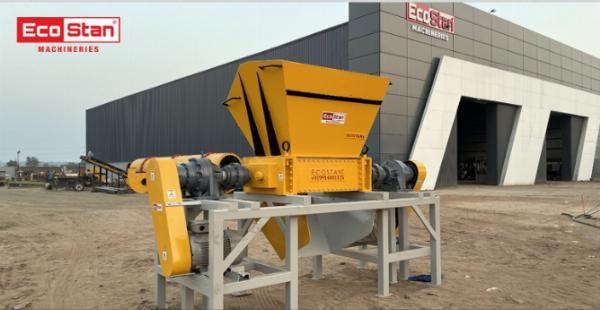Industrial Waste Shredder: The Ultimate Solution For Efficient Waste Management And Recycling

In today's rapidly industrializing world, managing waste has become one of the most pressing challenges for businesses. With the growing demand for sustainable solutions and eco-friendly practices, industries need to address the rising amounts of waste generated by their operations. One of the most efficient tools in combating this issue is the industrial waste shredder. It plays a pivotal role in reducing, recycling, and repurposing industrial waste, helping companies streamline their waste management processes while minimizing their environmental footprint.
What Is An Industrial Waste Shredder?
An industrial waste shredder is a heavy-duty machine designed to break down a wide variety of waste materials, including metals, plastics, rubber, paper, wood, and more. These machines are engineered to handle large volumes of tough waste, transforming it into smaller, manageable pieces. The shredding process not only reduces the volume of waste but also prepares it for recycling or disposal.
Key Benefits Of Industrial Waste Shredders
1. Volume Reduction: One of the primary functions of an industrial waste shredder is to reduce the bulk of waste materials. By shredding large pieces of debris into smaller fragments, it becomes easier to transport, store, or dispose of waste. This also leads to reduced transportation costs and lower environmental impact.
2. Recycling and Repurposing: Industrial shredders prepare materials for recycling by breaking them down into uniform sizes. Shredded waste can then be processed and repurposed for new products. For example, shredded plastic can be melted and molded into new items, while shredded metal can be smelted and reused in construction or manufacturing.
3. Cost Efficiency: Investing in an industrial waste shredder can lead to significant savings over time. Companies that handle large volumes of waste can reduce the costs associated with disposal, transportation, and landfill fees. Additionally, recycling shredded materials can open new revenue streams through the sale of recycled goods.
4. Compliance with Environmental Regulations: Many countries and regions have strict regulations concerning industrial waste disposal and recycling. Using an industrial shredder ensures that businesses comply with these environmental laws, avoiding hefty fines and contributing to a more sustainable future.
5. Enhanced Workplace Safety: Shredders improve safety by eliminating bulky or hazardous waste that can clutter workspaces. With waste materials properly processed and compacted, there is less risk of accidents or injuries caused by piles of scrap or oversized debris.
Types Of Industrial Waste Shredders
Industrial waste shredders come in various configurations, each designed to handle specific materials and waste processing needs. Here are the most common types:
1. Single-Shaft Shredder: This type of shredder uses a rotating blade to cut material against a fixed blade. It is ideal for processing smaller waste streams and is widely used in applications like plastic recycling and electronic waste disposal.
2. Two-Shaft Shredder: Two-shaft shredders use two rotating shafts to shred materials into smaller pieces. They are commonly used for more heavy-duty waste, such as metal, wood, and construction debris. These machines are known for their durability and ability to handle difficult materials.
3. Four-Shaft Shredder: Four-shaft shredders are used for applications requiring even finer shredding and greater precision. They provide a secondary shredding process to ensure that materials are reduced to the smallest possible size.
4. Granulators: These machines are used to granulate materials after they have been shredded. Granulators are particularly useful for plastics, turning them into small pellets that can be easily recycled.
Applications Of Industrial Waste Shredders
Industrial waste shredders are versatile machines with applications across various industries, including:
1. Manufacturing: Shredders are used to process leftover materials like plastic, rubber, and metal for recycling.
2. Construction: Shredders handle wood, drywall, concrete, and other construction debris for repurposing or proper disposal.
3. Electronic Waste (E-waste): Shredders are essential for safely breaking down electronics like computers, mobile phones, and televisions, ensuring that valuable materials like metals are recovered for recycling.
4. Agriculture: In agricultural settings, shredders are used to break down organic waste, which can be composted or repurposed as biofuel.
Conclusion
The industrial waste shredder is an indispensable tool in modern waste management. With its ability to reduce waste volume, facilitate recycling, and enhance workplace safety, this machine offers a cost-effective and environmentally responsible solution for industries looking to manage their waste more efficiently. By investing in a high-quality shredder, companies can contribute to a cleaner, greener planet while boosting their operational efficiency and bottom line.
Note: IndiBlogHub features both user-submitted and editorial content. We do not verify third-party contributions. Read our Disclaimer and Privacy Policyfor details.


